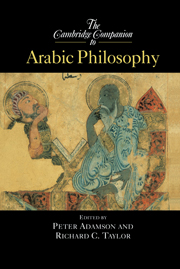Book contents
- Frontmatter
- 1 Introduction
- 2 Greek into Arabic
- 3 Al-Kindī and the reception of Greek philosophy
- 4 Al-Fāarābī and the philosophical curriculum
- 5 The Ismāīlīs
- 6 Avicenna and the Avicennian Tradition
- 7 Al-Ghazālī
- 8 Philosophy in Andalusia
- 9 Averroes
- 10 Suhrawardī and Illuminationism
- 11 Mysticism and philosophy
- 12 Logic
- 13 Ethical and political philosophy
- 14 Natural philosophy
- 15 Psychology
- 16 Metaphysics
- 17 Islamic philosophy and Jewish philosophy
- 18 Arabic into Latin
- 19 Recent trends in Arabic and Persian philosophy
- Select bibliography and further reading
- Index
1 - Introduction
Published online by Cambridge University Press: 28 May 2006
- Frontmatter
- 1 Introduction
- 2 Greek into Arabic
- 3 Al-Kindī and the reception of Greek philosophy
- 4 Al-Fāarābī and the philosophical curriculum
- 5 The Ismāīlīs
- 6 Avicenna and the Avicennian Tradition
- 7 Al-Ghazālī
- 8 Philosophy in Andalusia
- 9 Averroes
- 10 Suhrawardī and Illuminationism
- 11 Mysticism and philosophy
- 12 Logic
- 13 Ethical and political philosophy
- 14 Natural philosophy
- 15 Psychology
- 16 Metaphysics
- 17 Islamic philosophy and Jewish philosophy
- 18 Arabic into Latin
- 19 Recent trends in Arabic and Persian philosophy
- Select bibliography and further reading
- Index
Summary
The history of philosophy in Arabic goes back almost as far as Islam itself. Philosophically interesting theological disputes were underway within two centuries of the founding of Islam in 622 C.E. At the same time some important scientific, medical, and philosophical texts from the Greek tradition were being studied and used in the Syriac tradition, with Aristotelian logic being employed in theological debates. By the third century of the Muslim calendar (the ninth century C.E.), a great translation movement centered in Baghdad was in full bloom. In response, Muslim, Christian, and Jewish philosophers writing in Arabic began to make important contributions to a tradition of philosophizing that continues alive to the present day. Debates and contests on logic, grammar, theology, and philosophy by Muslims, Christians, and Jews took place at the caliphal court. The structure and foundation of the cosmos, the natures of entities in the physical world, the relation of human beings to the transcendent divine, the principles of metaphysics, the nature of logic and the foundations of epistemology, and the pursuit of the good life in ethics - in sum, the traditional issues of philosophy, old wine, albeit in new skins - were debated with intensity, originality, and penetrating insight.
This was the beginning of what one might call the classical or formative period of philosophy in Arabic, which goes from the ninth to the twelfth centuries C.E. During this period, authors working in Arabic received and reinterpreted the philosophical inheritance of the Greeks, especially Aristotle. This process culminated at the end of the classical period with the massive body of commentaries on Aristotle by Averroes. But the formative period involves more than just the continuation of the Greek philosophical tradition.
- Type
- Chapter
- Information
- The Cambridge Companion to Arabic Philosophy , pp. 1 - 9Publisher: Cambridge University PressPrint publication year: 2004



